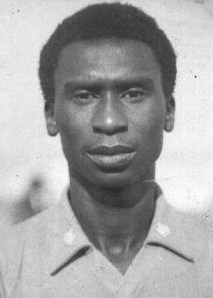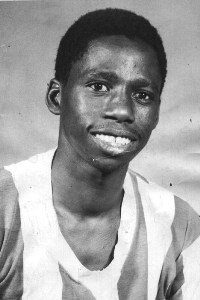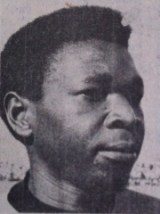Related Research Articles

David Efford Chabala, popularly known as Efford Chabala was Zambia's first choice goalkeeper from 1983 until his death in a plane crash off the Gabonese coast in 1993 and is Zambia's most capped player, with 108 full international appearances. Chabala was instrumental in Zambia's first ever East and Central African Championship success when he saved three penalties in Zambia's 3–0 shoot-out victory over Malawi in the 1984 final in Uganda after a goalless draw at full-time. He was named Zambia's Sportsman of the Year in 1985.
Godfrey Chitalu nicknamed Ucar was a Zambian footballer who played as a forward. He is widely regarded as the greatest Zambian player of all time as he holds his national team's goalscoring record and was voted Zambian footballer of the year five times. As well, he was selected by CAF as one of the best 200 African footballers of the past 50 years in 2006.
The Zambia Cup or Mosi Cup is the top knockout tournament of the Zambian football. It was created in 1962.

Alex Chola was a Zambian footballer and coach. Voted Zambian Footballer of the Year in 1976, he is regarded as one of the greatest Zambian players in history and is the country's second highest goal scorer after Godfrey Chitalu. He made a mark at Mufulira Blackpool and Power Dynamos before becoming Dynamos coach and winning the Coach of the Year award in 1992. Chola died in a plane crash off the coast of Gabon on 27 April 1993.

Samuel Ndhlovu was a Zambian footballer and coach. Nicknamed "Zoom", he led the "Mighty" Mufulira Wanderers to unparalleled league and cup triumphs for almost two decades. He was named Zambian Sportsman of the Year in 1964 and also served the national team as captain and coach. He is widely regarded as Zambia's best local coach.
Ashious Jordan Melu also known as Ashios or Ashols Melu was a Zambian footballer and coach who captained the national team from 1988 to 1992 and is credited with having one of the hardest shots in Zambian football.

Mufulira Wanderers are Zambia’s most successful football club, based in the Copperbelt town of Mufulira and currently playing in the Zambian Premier League after their 2018 promotion.
Dickson Kenneth Makwaza was a Zambian football player and coach. Nicknamed "Barbed-Wire" due to his tenacity in defence, he was one of the most decorated players in Zambian soccer history and was captain of the Zambian national team that made its first ever appearance at the African Cup of Nations tournament in Egypt in 1974. Makwaza also captained Mufulira Wanderers and was voted Zambian footballer of the year in 1973. He later coached Wanderers and several other club sides.

Moses Simwala was a Zambian footballer and coach. Nicknamed 'the chairman,' Simwala featured for Zambia and Rhokana United as a right winger, the same club he would go on to coach for over 12 years and become the most successful coach in Zambian club football, winning the league title a record 8 times and 21 trophies in all. He was voted Zambian coach of the year in 1988 and 1989.
Vincent Chileshe is a Zambian coach and former goalkeeper. He was crowned Zambian player of the year in 1977 at the age of 20, the first goalkeeper to achieve that feat, and was in goal for Zambia at CAN 1978. He is currently coaching Zambian Division 2 side Young Green Eagles.
Ackim Musenge is a former Zambian footballer and coach. Renowned for his exceptional defensive ability and versatility, Musenge is rated as one of the finest defenders to have played for the Zambia national team, which he captained at the 1978 African Cup of Nations in Ghana. He later coached Mufulira Wanderers and several other club sides.
Jani Liabwa Simulambo is a former Zambian footballer and coach. Nicknamed Be Good, Simulambo had an outstanding career and played at the heart of Zambia’s midfield for close to ten years, representing the country at the 1974 and 1978 African Cup of Nations and was named Zambian captain in 1980.
Jericho Shinde is a Zambian coach and former footballer. Nicknamed ‘Tanker,’ he was a star player for Rhokana United, winning four league titles and was also a linchpin in Zambia’s midfield in the eighties. After retirement, Shinde coached Nkana, Kalulushi Modern Stars and Power Dynamos.
Benjamin Bwalya Jnr was a Zambian footballer and coach. Bwalya was the son of soccer administrator Benjamin Bwalya Snr and the elder brother of celebrated former Zambian player Kalusha Bwalya. He played his club football for Mufulira Blackpool, Mufulira Wanderers and Nchanga Rangers, and after retirement he became Konkola Blades’ coach.
Boniface Simutowe was one of Zambia's greatest midfielders who also had a long career as a coach. He was the first footballer to be named Zambian Footballer of the Year and Sportsman of the Year in the same season and was part of the great Kabwe Warriors side that swept all the silverware on offer in 1972. He later took to coaching and was involved with the national team for several years.
Jones Chilengi was a Zambian footballer and coach. He played as a defender for Zambian club Green Buffaloes and captained Zambia to their first ever regional cup success at CECAFA 1984 in Uganda. He later coached Ndola United, Zamsure and Hwange F.C. of Zimbabwe.
Fighton Simukonda was a Zambian coach and former footballer. He was part of the Nkana Red Devils side of the 1980s, winning five league titles, and he also captained Zambia. As a coach, he won several Zambian Premier League titles and became the first coach to lead a Zambian club to the group phase of the CAF Champions' League.
George Lwandamina is a former Zambian footballer and head coach of the Zambia national football team. He had a brief playing career with Zambia and won several trophies as a defender with Mufulira Wanderers.
Philemon Mulala is a Zambian footballer who is best known for scoring two goals in the 1984 CECAFA Cup semi-final against Kenya, on their way to their first ever cup triumph. Nicknamed Shombo, he featured for Mufulira Wanderers in the same team as his elder brother, central defender Philemon Kaunda but is not related to Evans Mulala who also played in central defence in the same team.
George Sikazwe was a former Zambian footballer and coach, who played for Mufulira Wanderers and Zambia as a midfielder, representing his country before and after independence. He also served as Wanderers' coach and together with Samuel ‘Zoom’ Ndhlovu, he is credited with masterminding the team’s early success.
References
- 1 2 3 4 Tembo, Benedict. "Kashimoto: former midfield grafter grooming youngsters.” Zambia Daily Mail, 18 February 2012, p. 10
- ↑ "Kashimoto rejoins squad." Times of Zambia, 10 June 1987 p. 10
- ↑ Mulwanda, Gerald. "Seoul here we come" Times of Zambia, 1 February 1988, p.12
- ↑ "Fallen Mighty fire coaches", Lusaka Times, retrieved 8 October 2013
- ↑ Mwila, Chansa (1 October 2009). "Kashimoto to undergo surgery", The Post (retrieved 18 April 2013)